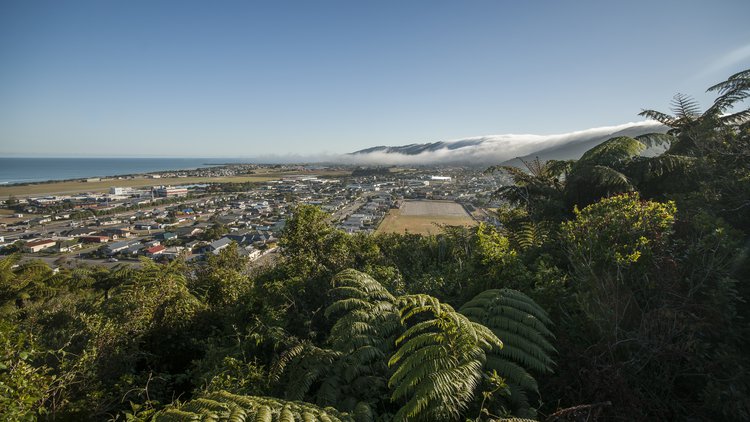Backed by Development West Coast (DWC) and its Nature Economy Project, the West Coast Predator Control Partnership, involves the combined forces of the Motukiekie Wilderness Trust, Paparoa Wildlife Trust, and the Rainy Creek Ecological Restoration Project. To date the partnership has employed 12 part time contractors, conducted over 1200 hours of predator control and secured $291,621 in external funding to sustain predator control operations across a combined area of 18,650 hectares.
First trialled as a pilot project over a 12-month period, in 2023/ 2024, the Nature Economy Project supports the partnership by providing strategic guidance, facilitation, and operational support to aid the collaborative effort. Previously, each trust had been working independently to remove predators, with the aim of preserving the habitat for indigenous species such as kiwi and long-tailed bats, however working in partnership is proving to be highly effective and rewarding.
Earlier this year, the team celebrated the sighting of a previously unknown population of seven Whio/Blue Duck within the Motukiekie Wilderness Trust project area. The discovery, made by Paparoa Wildlife Trust Manager Glen Newton and his certified protected species detection dog Tui, marked the first confirmed sighting of Whio in the Ten Mile stream catchment in decades.


“Confirming the presence of Whio pairs within our combined trapping zone is a major breakthrough. It shows that our years of hard work restoring habitat and controlling predators are paying off. It’s incredibly motivating."
“Without the predator control partnership and our paid rangers, I would have paused or shut down the project due to my burnout. Now I can focus on the broader perspective of the project including developing work plans, future goals, nurturing relationships with partners (DOC, Iwi, other groups and organisations)," says Leon Dalziel, Motukiekie project co-founder.
“The partnership has provided me with the time and space to upskill in certain areas such as GIS mapping, use of new technologies and predator control methods for specific species. Without the strategic support and planning from the Nature Economy Project, I don’t think this collaboration would exist."
“DWC brought the right people to the table, helped us shape a model that works, and supported us to build something we couldn’t have done alone.”
“This collaboration proves what’s possible when environmental goals align with economic tools,” says Zak Shaw, DWC. “The Nature Economy Project isn’t just about conservation; it’s about unlocking value for communities, landowners, and future-focused industries across the Coast.”
The new collaborative model has proved to be an effective way of bringing greater financial efficiency to how predator control operations are conducted. The partnership shares the costs associated with the employment of predator control rangers, who complete work across all three project areas on scheduled rotation. The sharing of costs has ensured that employment hours for both administrative roles, and operational roles are able to be sustained.


It has also provided a mechanism for resource sharing and for people with high level skills, qualifications and experience in conservation to help train the next generation of environmental leaders. Through a partnership with Tai Poutini Polytechnic (TPP), the partnership provides on the ground industry training to students and regularly employs Tai Poutini Outdoor Education programme graduates in predator control ranger roles.
“Through our partnership with TPP, we’ve managed to not only reduce burnout but actually grow the team,” says partnership team member Zane Smith. “We now have both paid and volunteer roles for young outdoor and environmental professionals, many of whom who have been trained here on the coast and are looking to build their careers in conservation.”
The West Coast Predator Control Collaboration demonstrates how conservation partnerships, with the right structure and guidance, can deliver measurable ecological and social impacts. It also offers a case study for how the Nature Economy Project can support business, industry, and community groups looking to align with nature-based investment opportunities.
“If you’re a business, or an investor looking at conservation through an economic lens, this project shows the kind of impact possible,” says Shaw. “It’s a proof of concept that conservation and community development can thrive together.”
The partnership would like to acknowledge the funding support it has received from the Lotteries Environment and Heritage Fund, World Wildlife Fund, Department of Conservation Community Conservation Fund, and NBS.
West Coast Predator Control Partnership
Other news
Tourism mission targets Chinese growth for West Coast
Development West Coast (DWC) chief executive Heath Milne has returned from a multi-city tourism trade mission to China and Hong Kong, promoting the region as part of the South Island Kia Ora South delegation.
Learn moreLong-Serving DWC Chair Renee Rooney not seeking re-election
DWC Chair Renee Rooney has announced she will not seek re-election in the 2025 Local Body Elections.
Learn moreNew campaign turns up the heat on West Coast winter travel
Development West Coast (DWC) has launched a cheeky new campaign to attract off-peak visitors by positioning winter on the Coast as something to embrace — not escape.
Learn moreWest Coast surges to second place in regional economic scoreboard
The West Coast has achieved its highest ranking in four years on ASB’s Regional Economic Scoreboard, surging into second place nationwide off the back of strong growth in construction, retail spending, and primary sector resilience.
Learn moreNorth Islanders flock to the West Coast, new data shows
The West Coast is becoming an increasingly popular destination for North Islanders, with new Census data revealing a growing number of people making the move south.
Learn moreWest Coast stories shine on national stage
Development West Coast (DWC) has been recognised with three Silver Awards at the 2025 Public Relations Institute of New Zealand (PRINZ) Awards, held in Auckland on Wednesday evening.
Learn more





